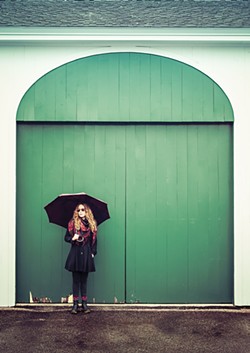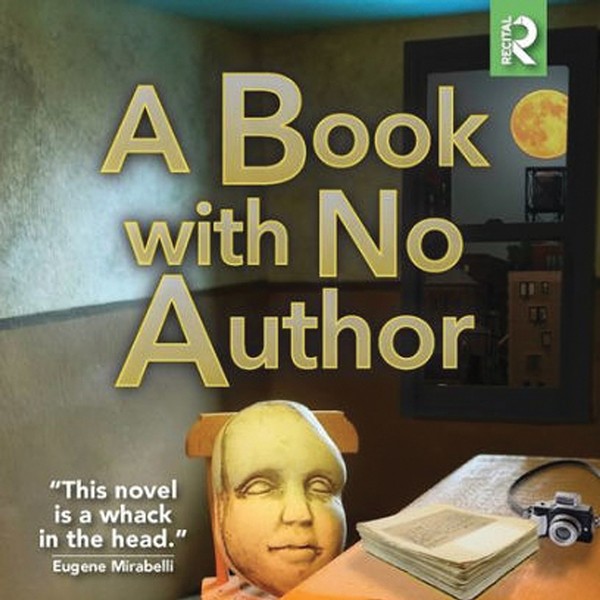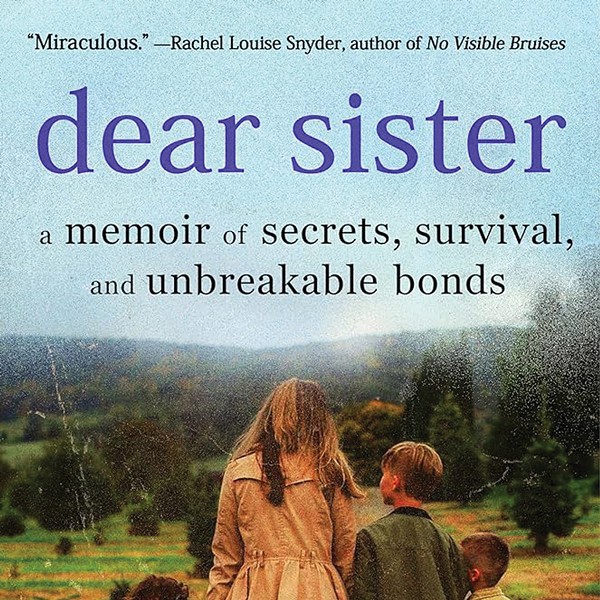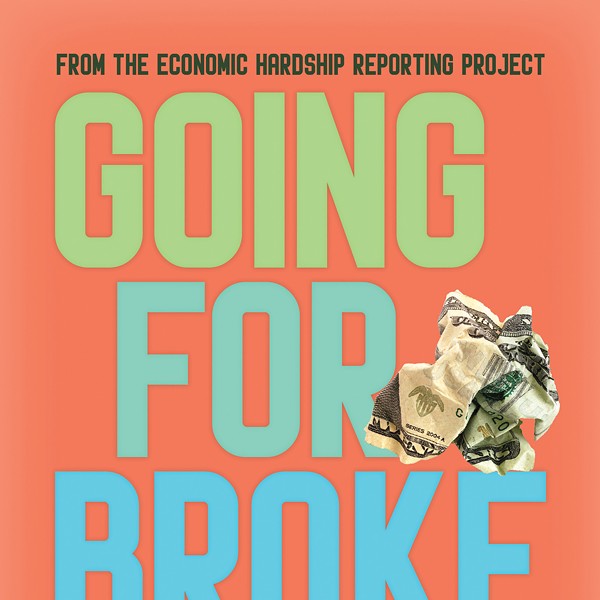Chloe Caldwell refers to her latest book of essays, I'll Tell You in Person (Coffee House Press, 2016), by its anagram, ITYIP. The letters could just as easily stand for someone's drunk-texted (and slightly misspelled) shout-out for this book: It, Yep! Which makes sense, given Caldwell's snappy, all-embracing, tough-fragile, Wow, really? take on the world.
The collection is her second. The first, Legs Get Led Astray (Future Tense Books, 2011), came out when she was 26. ITYIP includes a dozen essays. The prologue-ian "In Real Life" sparks out this glistening, angry-vulnerable phrase to get the reader's motor going: "So fuck you, Miki Howard." (Caldwell discovered a personal essay by the relatively unknown writer Miki Howard in a small-press anthology when she was 19. She refers to it as an aha! moment. "I realized it was what I wanted to do," Caldwell says.)
Often, if an essayist writes of her own disasters and vulnerabilities and curses, she's labeled edgy, and I suppose Caldwell is, but not for effect. She's just irrepressible. Knitting together the flotsam and jetsam of modern life—frenemies, family, sex, celebrity (Lena Dunham, hilariously), yearning, solitude, bad behavior—she writes with caffeinated hindsight, always aiming for the heck-yeah truth.
Perhaps by staying self-taught, Caldwell found the license to write refreshingly unfiltered prose. Over a few days we discussed work, music (present faves include Elvis Perkins and Stephin Merritt), volunteering (she helps out at the Promise, a Hudson afterschool center), and our abiding love for the great spoken-word-goddess-turned-novelist Maggie Estep (we both refuse to weigh down Estep's ever-presence with the words "the late"). If Caldwell belongs in any school, it might be the Estepian one, where everything happens for a reason even when it doesn't, and life feels like a stumble through the dark until you realize everything's glowing—if you're awake enough to notice. Caldwell is.
So, fearlessness: Some people worry about publishing personal essays because someone might get mad. In your case, fear seems to give you more momentum.
I worry about it all the time. But I began publishing personal work in my early 20s, and it turned into my livelihood, both financially and emotionally. It's a blessing and a curse. Fact is, I was aimless and lost until I began writing, so it's helped me create a grounded life.
I do think women writers are asked more about how writing personal nonfiction affects their relationships more than male writers. I recently wrote an essay speaking to this, "What I Think about the Fact that You Keep Asking Me What My Family Thinks of My Writing," in the online lit journal Catapult.
You're plenty candid, but in a nice way. It's not a bridge-burning approach.
My writing has made me closer with family and friends—none of my relationships have been ruined because of it. I think that's because I'm not writing about what assholes people are—I throw myself under the bus just as much, if not more, than others, and I write from a genuine place of love. But growing up my home was filled with memoirs, so I never thought it was out of the ordinary to write about your life.
When you're writing, what's your state of mind? If you don't mind my asking, what's your schedule, if any? Asking for a friend.
I'm super focused. I'm good with tunnel vision. I teach for a living, online and in New York City, so I have to juggle my students' work with my own. I'll get up around 8:30 am, make a hot drink, go to my desk, and let myself work on my own stuff (a book, a freelance essay, interview, etc.) Around 11, I switch to my students' work. That way I've gotten my own shit out of the way and there's no resentment toward the classes I teach. I work until late afternoon, then shower and do real-world errands and such.
Are you really afraid of dogs? You have that line from "In Real Life": "I displaced my enormous anxiety onto dogs." But you also write about being in the car with Mickey, Maggie Estep's sweet pal. So am I wrong?
What a super observation. You are not wrong—even though I've dog-sat many times for various families, I am closet-ly afraid of them. But it's not a crippling fear, so if I dog-sit I don't tell the family. The local writer Elisa Albert once told me that a therapist told her that people afraid of dogs are afraid of unpredictable anger. Isn't everyone afraid of unpredictable anger, though? Anyway, I'm currently working on a piece about my dog conflict. I think it's interesting how it's becoming "cool" to say you dislike babies, cats, marriage, but being afraid of dogs is uncool. I don't remember if I told Maggie I was afraid of Mickey or not. I wanted her to love me, so I probably hid it. I think she would find that very funny.
So what are the things, actually, that keep you up at night?
Not much keeps me up at night (notice I'm taking this question literally) because I fall asleep as soon as my head hits the pillow, though maybe that's because I'm a melatonin junkie and do yoga.
Do you think your writing has changed since your first book? And your ambition, or that invisible bar set in the sky—has that changed?
Absolutely. In my first book my writing was raw and urgent. I'm not a classically trained writer, so with each book I release I see my faults and how I've grown/changed. I learn a lot from reviews: what's working and what isn't (I also learned you can't please everyone). Basically, I have been learning to write in real time, while publishing books. I learn a lot from my students and having to teach craft, something I barely studied myself. I think that's why my writing is the way it is. It hasn't gone through years of workshops. It isn't calculated.
That's the silver lining of not going to school or getting an MFA. I had nothing, expected nothing, don't think anything is owed to me, so I'm just grateful I get to write and teach for a living. No one promised me a huge advance. Of course, I dream about getting a six-figure book deal. Who doesn't?
Who doesn't indeed? There's a really touching, sad, funny, and very Maggie essay in ITYIP, "Maggie and Me: A Love Story," about your friendship with her. What effect did she have on your work?
Recently I heard a podcast with the author Siri Hustvedt about how a past student called her a "complicated woman," and how pleased she was with that description. It applies to Maggie: She was so complicated and had lived such a rich life. Maggie and I connected at the yoga studios on Warren Street. We were both yoga junkies, and realized we both had essays in Sari Botton's anthology Goodbye to All That. I'd just moved back to Hudson from Oregon, and one night after Tuesday night hot yoga we began talking. It was like we looked at each other and said: You. You're my new friend. She was a mentor of sorts to me—her career was fleshed out, she'd been through the ringer, and mine was only beginning. We even looked at an apartment together. I did a reading with her at Oblong Books on February 9th, 2013, went to her Saturday morning yoga class on Saturday the 10th, and she was dead on the 12th.
It's so frustrating not to have her here, but I feel lucky to have crossed paths with her at all. I can still feel her support. There are days I don't want to go to yoga, or write, or go volunteer. But Maggie would tell me to get off my ass and go. I can remember still being in bed some mornings and she'd text me: Get your ass to Sadhana! Now!
Do you think living in the Hudson Valley, instead of, say, New York City, makes it easier to write?
One hundred times easier. That the post office, bank, and my therapist are all in a five-block radius saves so much time. I spent my 20s living in various cities, running to trains, waiting for buses. In Hudson I get a ton more done. I pay $600 in rent, and there's just enough going on here that I don't get bored, but I also don't spend all my time on barstools like I did when I lived in New York City. That you can get into nature and go on peaceful walks and have time to think has been great. I'm from Spencertown, so at heart I love nature.
And has this election affected you? There are various quotes meant to help us, like "Be brave, make art"; "Fight back, make art"—do you relate to those?
It's just a fraught time. Some of my writer friends think we should minimize our own voices to maximize more important political ones. Then there're people who say, Think about all the great art and comedy that will come out of this! Which outrages others—you can't win. But I think books, film, music, art are all more important than ever. And I suppose it's old-fashioned to say the personal is political, but I think that women writing about their experiences is so acutely something the president-elect is totally against. Which makes me want to do it even more, and support all of my female students in telling their traumas—abortions, rapes, etc. The more women who speak up, the better.


















